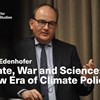staving
Simulating the Future Pension Wealth and Retirement Saving in Sweden
In this paper, wealth consequences of the Swedish pension system in the transition from a defined benefit to notional defined contribution system are simulated with almost exact institutional detail,
Lobbying for profits
If a social scientific observer of the mid-1980s had been presented with a line-up of rich Western countries – say Germany, Sweden, the UK, France, the US – and asked to guess which of these countrie

Voting behavior, policy responsiveness and democratic anger. Interview with Armin Schäfer
European citizens with low socio-economic status are staying away from the polls in disproportionate numbers. Some of them say it is because politicians don't care about them anyway. Are they right? P
From Transfers to Individual Responsibility: Implications for Savings and Capital Accumulation in Taiwan and the United States
A demographically realistic model incorporating life cycle saving motives is used to simulate effects of changing a transfer-based old-age support to a funded system, applied to the cases of Taiwan an

Ottmar Edenhofer: A New Era of Climate Policy
Research seminar with Ottmar Edenhofer, who is Director and Chief Economist of the Potsdam Institute for Climate Impact Research as well as Director of the Mercator Research Institute on Global Common
Healthcare Rationing and the Badness of Death: Should Newborns Count for Less?
in: Saving People from the Harm of Death, Eds. Espen Gamlund and Carl Tollef Solberg, p. 255-266, Oxford University Press. In this volume, leading philosophers, medical doctors, and economists discuss
Ottmar Edenhofer: Climate, War and Science. Practical Dilemmas, Theoretical Challenges and a New Era of Climate Policy
Venue: Institutet för framtidsstudier, Holländargatan 13 , 4th floor in Stockholm, and online REGISTER >Research seminar with Ottmar Edenhofer, who is Director and Chief Economist of the Potsdam InstAbstractStarting by stating the current status quo of climate change, the talk focuses on the practical dilemmas an ambitious climate policy is facing, also on the grounds of the theoretical challenges involved. The present geopolitical global situation is calling for a new era of climate policy. But how do we get there?
Should the probabilities count?
Philosophical Studies, June 2012, Volume 159, Issue 2, pp 205–218. Online first. doi.org/10.1007/s11098-011-9698-1 Abstract When facing a choice between saving one person and saving many, some people ha
Intergenerational Public and Private Sector Redistribution in Sweden 2003
The paper describes intergenerational redistribution in Sweden the year 2003. Looking over the whole life, the summed per capita consumption from both the private and public side is quite smooth until
Lukas H. Meyer: Fairness is most relevant for country shares of the remaining carbon budget
Lukas H. Meyer, Professor of Philosophy at the University of Graz, Austria, and Speaker of the Field of Excellence Climate Change Graz, the Doctoral Programme Climate Change, and the Working Unit MoraIn my talk I argue that fairness concerns are decisive for eventual cumulative emission allocations shown in terms of quantified national shares.I will show that major fairness concerns are quantitatively critical for the allocation of the global carbon budget across countries. The budget is limited by the aim of staying well below 2°C. Minimal fairness requirements include securing basic needs, attributing historical responsibility for past emissions, accounting for benefits from past emissions, and not exceeding countries’ societally feasible emission reduction rate. The argument in favor of taking into account these fairness concerns reflects a critique of both simple equality and staged approaches, the former demanding the equal-per-capita distribution from now on, the latter preserving the inequality of the status-quo levels of emissions for the transformation period. I argue that the overall most plausible approach is a four-fold qualified version of the equal-per-capita view that incorporates the legitimate reasons for grandfathering.








